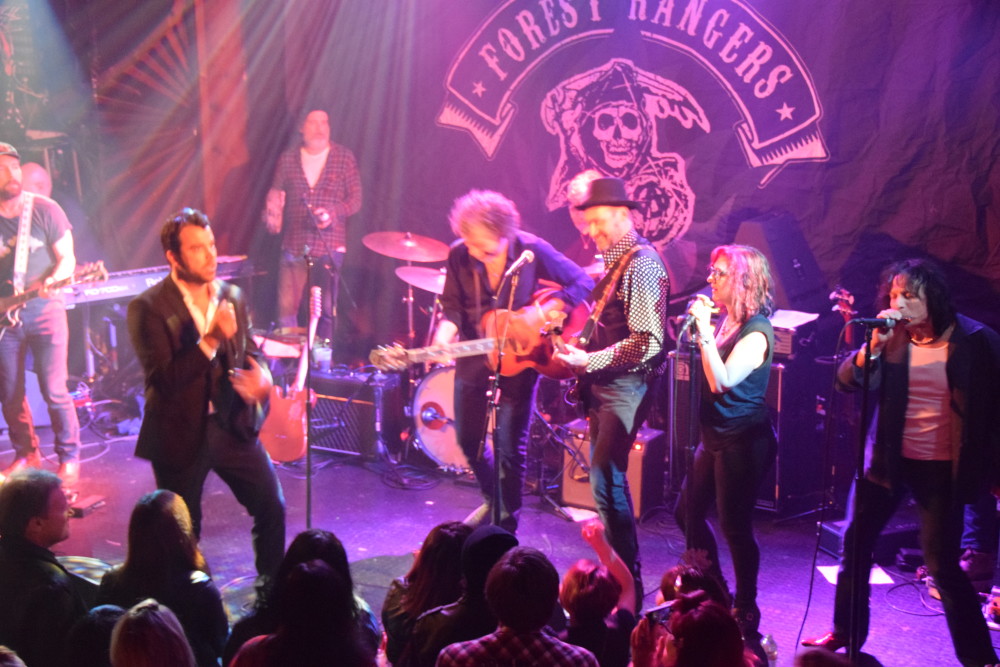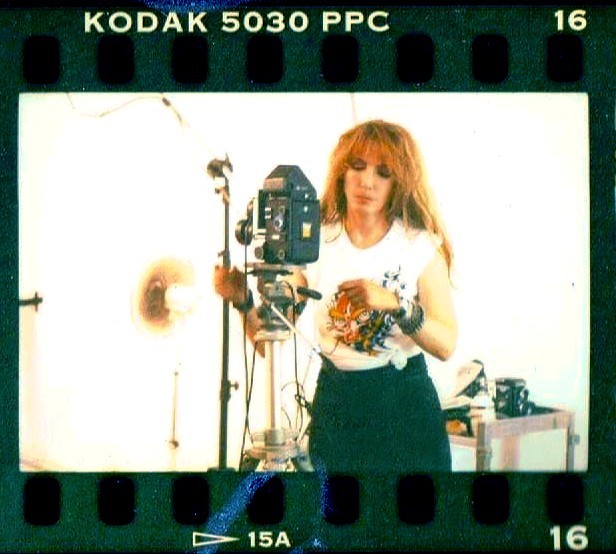
Music’s Busiest Sideman Steps Out with New Album
– Steve Postell, known for his work with fellow musicians from David Crosby to The Immediate Family, is a prolific sideman who steps out front with his new album, “Walking Through These Blues.” Educated in music in New York, Postell says his latest collection is a personal contribution towards keeping the art of music a human endeavor.
US Rocker: You are one of the busiest musicians I know. I think you’ve worked with just about everybody. Your new album, “Walking Through These Blues” sounds like you’re influenced by Crosby, Stills and Nash, a little James Taylor. You’ve probably worked with some of those guys.
Steve Postell: You stick around long enough you get to meet some of your influences and it always reminds me of Tom Petty talking about when he got to be in a band with Bob Dylan and how profound that was for him. Dylan was a big influence on him and I’ve had that experience of getting to work with people that I kind of grew up with and that they gave me a template for what it meant to be a song.
US Rocker: How did you break into the business?
SP: Well, in a broad sense, if you mean “the business” by getting paid to make music, it was kind of a fluke. Many, many, many years ago, I was probably 19 or 20, I think I was 19, I was actually taking a lesson. I already could play very well, but I was trying to learn some jazz harmony from this wonderful teacher Myron Weiss, and we were in a little studio on McDougal Street. Back then there weren’t even phone machines. The phone rang and we kind of had to pick it up. Well, he picked up the phone and he looked over at me and he said, “Hey, you wanna go on tour with the show ‘Man of La Mancha?'” He said, “I’ve got the guy right here who could do a great job,” and so all of a sudden I went from being a guitar student to being on a national tour. So that’s how my career started. Then I was off and running.
US Rocker: So you actually started in musical theater?
SP: I played “Evita” for two years with Patti Lupone and. And so I, yeah, I did that for a number of years when I was young.
US Rocker: What a background. Where did you grow up, Steve?
SP: New York City.

US Rocker: What inspired the new album, “Walking Through These Blues?”
SP: I was actually teaching a guitar lesson. And my student brought in a song by John Mayer, and he couldn’t figure out how to play it. And John Mayer is a wonderful songwriter, but he’s a really, really wonderful guitar player. And so this particular song had an interesting right-hand pattern that was not easily imitated by the student. So I figured out that pattern and showed it to him and taught him myself. And after he left, I thought it’s a cool thing that he did with his right hand, I made it a minor song. The concept for the album is that as you’re going through life, you walk through it. It’s full of landmines and ups and downs. And that the way to approach that is calmly. You walk through it, you don’t, you don’t bang against it, you don’t fight it ferociously, you don’t avoid it. You just walk through it, and that’s how you get to the other side of difficulty.
US Rocker: Is that what’s gotten you through the ups and downs of the music business?
SP: In some respects, the music business is very unforgiving, as everyone knows. I’ve been doing this long enough and had so many different genres and different realms that you have to learn to get off the mat, cause some things will work out, some things won’t. Some people will be kind, some people won’t. If you’re too sensitive and reactive to the disappointments, which ultimately inevitably will happen as an artist, you’re not gonna make it through.
US Rocker: Are there any situations you can think of where you had a disappointment that actually turned into a victory?
SP: I’d say all of them. That’s the nature of the game. There’s almost always an avenue that comes out of something that doesn’t work and turns into something that does. There are many examples, but I remember I was going to work with the lead singer of Three Dog Night, Chuck Negron. And I couldn’t start when they wanted to because I had a commitment. And so they had to go to someone else. I was disappointed but then I ended up getting a call the next day from Iain Matthews, so it worked out.
US Rocker: Tell me a little bit about the inspiration for the track, “When The Lights Go Out.”
SP: That’s an easy one. I was sitting in my high-tech world surrounded by all my technology. I had the television on, had my computer on, had my iPad on. I was talking on the phone in this office with electricity whirring around me and all of a sudden, everything went quiet. And the lights went off, television went off, there was no power, my computer went off. And I just had a thought, well, “what do you do when the lights go out?” And I went, oh, that’s a great metaphor. I’ll tell you what you do, you write a song about it. So that’s how that happened.
US Rocker: That’s a conundrum nowadays.
SP: I know a couple of friends of mine have. You know, older teenage kids and they went on vacation to a beautiful town in northern France, this was probably 10 years ago and there was no cell service there and these kids went nuts. They didn’t know what to do. They were in this really beautiful place like Normandy, I believe. And today a lot of people depend on the technology to make music. They have apps today that make chords for them and even chord progressions and sounds.

US Rocker: How do you feel about technology intersecting with songwriting?
SP: Well, I think like many things, it has a very beautiful side and has a dark side. I try to stay up on technology. I use it in my studio, of course, all of us record digitally and I keep my apps up to date. There are incredible simulations of sounds and amps and effects and you know, so the technology has allowed that anybody with a laptop or even an iPad to be able to do more than we could do with a $600,000 system 25 years ago or 30 years ago. I’m always getting new technology and marveling at what it can do for me.
The downside, is, so I don’t use the technology as a shortcut. I use it to improve my efficiency. But a lot of people now use it as a shortcut to not have to do the work and they don’t learn what we had to learn. And now with AI creeping into music, you can have AI almost write a song for you. People are using technology without having much background other than technically knowing how to use these tools but. Personally, I don’t think that it’s ever gonna have the depth and gravitas and emotional impact of knowing your art and and making real art. I just don’t think it ever will. I hope it won’t.
US Rocker: Are you concerned that maybe AI might “borrow” or incorporate some of your original songs into its database? When someone wants to write a song, they pull up something on AI and, you know, perhaps AI has borrowed from you to give to that next person…
SP: Yes, absolutely, I mean, it’s gonna, it’s already happening. So you can put a song into AI and say, “rewrite this.” And it’ll take elements of that song like the rhythm, you know, flip the chords around and change the chord changes and alternate the melodies so that it’s not, it’s no longer a copyright infringement. But AI is gonna do a lot worse things than just steal music.
US Rocker: Were you thinking of someone in particular when you wrote “Wait Until You Get Here?”
SP: Well, I was thinking of me, as an older man. I remember I was on a subway in Manhattan going to my music school, Mannes College Of Music. It was a very intensive program and I was on the subway trying to get my homework done. And a very well-dressed, elegant gentleman was sitting next to me, an older gentleman. He was kind of looking over at what I was doing and turns out, he was a prominent musician in Germany, since retired. A beautiful, eloquent gentleman and he gave me a little advice and told me about structure of music don’t ever skip steps. Anyway, it was a great conversation and I sort of imagined him. When I was writing that song. And so it’s a combination of someone like him. Looking back and talking to someone younger. I was also imagining myself older talking to my younger self, of course, I’ve since gotten to be that older guy talking to my younger self. So when I sing this song now, I almost sing it from the from the first-person point of view.
US Rocker: It’s very poignant and very sweet. The whole album, how long did it take you to put this collection together?
SP: Well, it, it took a long time, but that was more circumstantial. Most of the record was made during COVID. And what that did was a few things. One is, I couldn’t really get anyone in the studio at that time. No one was going anywhere. There were people I wanted to be on the record. And for most artists, the whole idea of making records is you make the record and then you go out and you perform and people play the music and they hopefully are moved by the record. Well, I couldn’t perform, so there was really no reason to put out a record, so I was like OK, I can keep working on this. And then, this other band I’m in, The Immediate Family, needed me.

US Rocker: Right.
SP: And so really it was 4 years, which is a long time, before the timing was really right. But it gave me an opportunity to remix it and really refine it and add people I like.
US Rocker: What is happening with The immediate family?
SP: For people who don’t know, The Immediate Family is myself, Waddy (Wachtel), Leland Sklar, Danny Kortchmar and Russ Kunkel. And between us, we’ve (participated in) many, many thousands of records. I know for a fact because it’s been documented, Leland has played on well over 2000 records and probably the rest of them as well. Many of the songs they either wrote or produced or certainly played on became very big hits. And when we would go out to perform, it would be sort-of half the shows of the new music we were writing and half would be these hits I’m talking about. Like “Werewolves of London” and “Somebody’s Baby” and so forth. So we realized about a year ago or so, you know, we’ve never. recorded our own versions of the hits we should do. Yeah so we recorded 12 of these great songs and we’re ready to mix that. So the next thing we’re doing is mixing that record of the hits, and that’ll be really fun to work on and to release.
US Rocker: That’s great. Is there a tentative title for the record?
SP: Not yet.
US Rocker: What else do you want to say about “Walking Through These Blues“?
SP: I’m proud of it. I’m fortunate that I work with a lot of really incredible musicians, and this record has many of them on it, some of the most talented people I’ve ever known. I just love making music this way and I hope it’s a tradition that does survive the digital world. I do believe that it will and this is my little contribution to making music in a very organic way, even using the new tools.
Check out Steve Postell and crew at McCabe’s here:
– Q and A Curated and Edited by Donna Balancia



